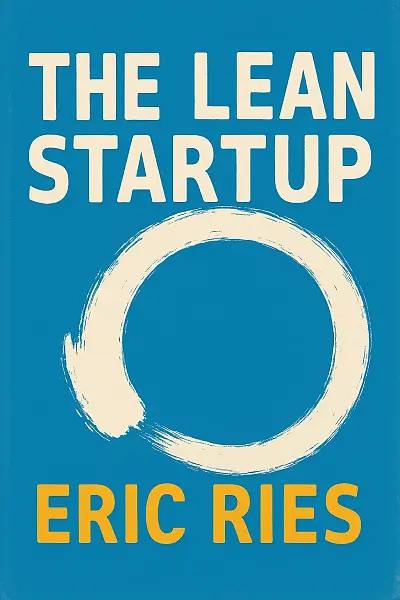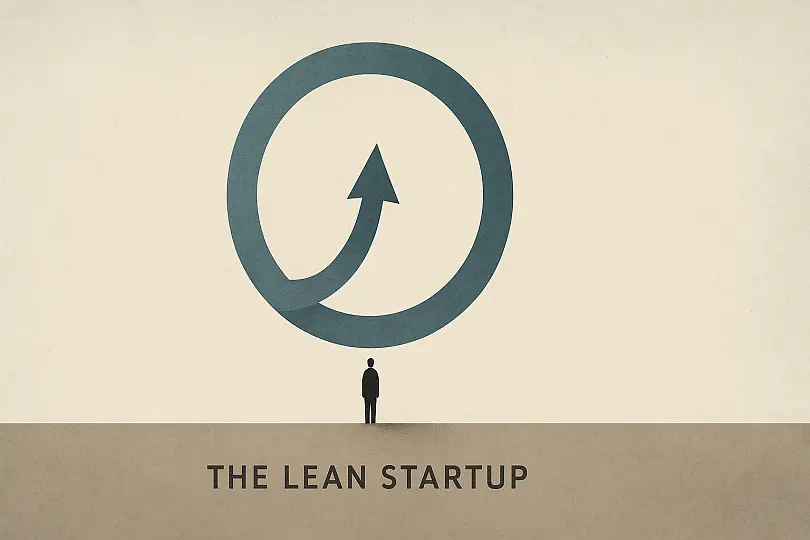
The Lean Startup
by: Eric Ries
Eric Ries starts out as a passionate entrepreneur, working in the chaotic world of startups where uncertainty reigns supreme. Every day, he dreams of building something new but feels lost amid traditional business advice and overwhelming risks.
Everything shifts when he discovers the lean principles—a bold, experimental way to tackle the unknown. Suddenly, Eric faces the game-changing challenge: can founders truly listen to customers, pivot quickly, and avoid failure before it’s too late?
With organizations on the line and creativity at stake, the pressure mounts. Can they adapt and thrive, or will old habits hold them back?
""Progress isn’t measured by the perfection of your plan, but by how quickly you learn and adapt on the road to building something that matters.""
Let's Break This Down
The Author's Voice
Atmosphere
Focused, practical, and energizing
- The book radiates a relentless, can-do optimism that’s grounded in the bustling reality of modern startups
- It creates a feeling of urgency and possibility, tossing you into the heartbeat of innovation
- The environment is brisk, no-nonsense, and filled with stories of both breakthrough and failure—there’s a sense that the stakes are real and every page could spark your next big idea
Prose Style
Direct, accessible, and occasionally repetitive
- Ries writes in crisp, business-like sentences—no frills, no jargon, no rambling
- His tone is supportive and clear, almost like a seasoned mentor talking you through pitfalls in plain English
- Examples and personal anecdotes are used to break up concepts and keep the text from feeling too abstract
- There’s a tendency to hammer home key points, which reinforces main ideas but sometimes slows the momentum for readers already familiar with the basics
Pacing
Steady, methodical, yet motivating
- The chapters are well-structured, guiding readers step-by-step through principles with a logical, easy-to-follow flow
- Case studies and real-world examples pop up at smart intervals—just when you need them most to illustrate concepts
- Occasionally, the pacing dips when concepts are explained at length or reiterated, but it rebounds quickly as new frameworks or tools are introduced
Overall Vibe
Informative, approachable, and actionable
- This is a book that wants you to get up and start doing—there’s energy on every page
- Whether you’re already in startup mode or just curious, you’ll feel encouraged and equipped to experiment
- Expect guidance, not inspiration; solutions, not theory—if you want actionable tools with a dash of real-life drama, you’re right where you need to be
Key Moments
- "Build-Measure-Learn" loop that flips traditional business plans on their head
- Epic pivot moment: when Ries realizes relentless iteration trumps genius ideas
- Minimum Viable Product stories—raw, quick, and sometimes hilariously scrappy
- Founder confessions: sleepless nights, brutal failures, and aha! breakthroughs
- Sobering lesson: Vanity metrics vs. actionable data—data geeks, you're in for a wake-up call
- Startup fairy dust? Nope. This is all about relentless testing and embracing what doesn't work
- Undercurrent of optimism—a persistent belief that anyone can innovate with the right mindset
Plot Summary
Let’s break down The Lean Startup—it’s not your typical story-driven book, but it does have a clear narrative arc. Eric Ries starts by laying out his own start-up struggles, introducing the constant cycle of creating products, facing failure, and learning from mistakes. As the book progresses, he unveils the core concept of the “Lean Startup” methodology: build-measure-learn. Through real-life case studies—like his experiences at IMVU and various other tech companies—Ries shows the highs (like early wins from quick pivots) and lows (major setbacks and product flops). The climax centers around the adoption of minimum viable products and the power of “pivot or persevere” decisions. By the end, Ries resolves with a playbook for continuous innovation, arguing that disciplined entrepreneurship can turn uncertainty into success, leaving readers with actionable steps to apply these lessons themselves.
Character Analysis
The “characters” in The Lean Startup are mostly entrepreneurial archetypes and real founders, including Eric Ries himself as a very relatable, learning-by-mistake narrator. Ries comes across as humble and analytical, growing from a frustrated founder focused on perfect products to a pragmatic leader who embraces failures as data. Other “characters” include ambitious co-founders, skeptical investors, and overworked engineers, who evolve from resistant skeptics to advocates for experimentation and validated learning. Everyone’s motivation is survival in a tough market, and by book’s end, you see that even seasoned professionals must adopt a beginner’s mindset to innovate and succeed.
Major Themes
Innovation through iteration is easily the central theme—Ries wants us to see that success comes from continually testing ideas instead of sticking stubbornly to one vision. Failure isn’t just a possibility but a necessity, reframed as an essential feedback mechanism rather than something to avoid. Another strong theme is the democratization of entrepreneurship; Ries shows that anyone, not just “genius” founders, can build successful startups by following smart processes. Throughout, he explores the conflict between vision and reality, urging entrepreneurs to balance bold dreams with evidence-based tweaks, as seen in his stories about companies that win by pivoting rather than sticking to their original plans.
Literary Techniques & Style
Ries writes in a super accessible, almost conversational style—he’s all about clear explanations rather than fancy prose. The structure is logical and iterative, much like his methodology: each chapter sets up a problem, explores it through anecdotes and mini-case studies, and ends with actionable guidance. While not heavy on traditional literary symbols or metaphors, Ries does use the “startup” as a metaphor for learning and survival in a chaotic world. The repetition of cycles—build, measure, learn—acts almost like a refrain, reinforcing his advice and echoing the iterative approach he teaches.
Historical/Cultural Context
The Lean Startup emerged in the wake of the late 2000s tech boom and financial crash, when Silicon Valley was reeling from overhyped failures and investors craved more accountability. This book is totally a product of start-up and innovation culture, reflecting a moment when rapid experimentation, venture capital, and agile thinking were transforming business. Culturally, it catches the shift from top-down business models to bottom-up, data-driven, and even democratized approaches to entrepreneurship.
Critical Significance & Impact
Since its release, The Lean Startup has become a cornerstone for entrepreneurs, educators, and even big corporations, who now preach “lean” and “agile” like gospel. Critics praise its practical advice and relatability, though some think its core concepts are overstated or best suited to tech start-ups. Nevertheless, Ries’s ideas about iteration, measurement, and resilience have rippled out to influence management, education, and product design everywhere—making it a must-read for anyone interested in innovation and business transformation.

Reinvent business with agile innovation—fail fast, learn faster.
What Readers Are Saying
Right for You If
If you’re even remotely curious about how startups tick or if you dream of launching your own business someday, The Lean Startup is seriously up your alley. Honestly, it’s a goldmine for:
- Entrepreneurs (or anyone with that entrepreneurial itch)
- People working in tech, innovation, or fast-changing industries
- Managers, product folks, or marketers who love systems, structure, and efficiency
- Fans of real-world case studies who want nitty-gritty, behind-the-scenes stories
- Anyone tired of endless, outdated business theory and looking for practical tools they can actually use
If you love reading about how bold ideas get built, tested, and improved quickly, you’ll get a ton out of this. Especially if you geek out over things like agile workflows, failing fast, and measuring what actually matters—Eric Ries gets right to the good stuff.
But hey, if you really just want an inspiring memoir or a “rags-to-riches" story, you might feel a little bogged down here. It’s definitely more hands-on and tactical, not super heavy on drama or personal journey.
Also, if you find business books too step-by-step or you prefer stories over strategy, this one might feel a bit dense at times. And if you’re deep in a corporate setting with zero plans for change or innovation? You might not find what you’re looking for—unless your office secretly craves a shakeup.
Bottom line: If you thrive on actionable ideas and want your brain firing up with new ways to build, test, and grow anything—from apps to side hustles—you’ll probably love this. But if you’re in it for pure inspiration or sweeping, feel-good tales, maybe grab something story-driven instead.
What You're Getting Into
Ready to shake up how you think about launching a business?
The Lean Startup by Eric Ries dives into the fast-paced world of entrepreneurs, following their passionate pursuit of innovation in a landscape filled with uncertainty and risk. Anchored around the struggle to turn bold ideas into successful companies, Ries introduces a dynamic process that helps founders test, learn, and adapt without wasting time or resources. This book delivers practical wisdom, inspiring stories, and a fresh, energetic approach—perfect for anyone dreaming big and ready to build smarter, not just harder.
Characters You'll Meet
-
Eric Ries: The author and central guide throughout the book, he's a startup founder turned mentor who shares practical lessons from his own experiences and failures. His relentless curiosity and commitment to learning shape the whole "Lean Startup" philosophy.
-
Entrepreneurs: Representing startup founders and innovators, these characters embody both the hopeful ambition and frequent frustration of launching something new. They drive the narrative experiments and pivots, learning to embrace uncertainty.
-
Early Adopters: These are the passionate first users who validate—or reject—new ideas. Their candid feedback and willingness to try unproven products play a pivotal role in shaping what works and what gets scrapped.
-
Investors/Mentors: The folks providing guidance and funding, often influencing strategy with their expectations and experience. Their presence pushes teams to think bigger, but sometimes sparks tension between vision and pragmatism.
More Like This
If you've ever been inspired by Stephen Covey’s The 7 Habits of Highly Effective People, you'll notice how The Lean Startup brings that same practical, actionable mindset to the world of entrepreneurship. Where Covey offers personal productivity frameworks, Ries zooms in on startup ecosystems, yet both books are all about efficient learning, adapting, and bringing structure to chaos. It’s like they’re in conversation, each championing purposeful action but from different stages of the business journey.
Fans of Simon Sinek’s Start with Why will instantly see the overlap—both authors passionately promote a sense of core purpose, but Ries dives deeper into the tactical trenches. While Sinek rallies readers around the importance of mission-driven leadership, The Lean Startup unpacks the nuts-and-bolts strategies for iterating toward that mission, giving you the hands-on tools to actually build something that lasts.
And if you ever got caught up in the frantic energy of Shark Tank, you’ll find that The Lean Startup captures a similar spirit but with more structure and less spectacle. The book echoes the show’s relentless pace and quick-fire decision making, spotlighting entrepreneurs’ need to test, pivot, and learn from failure in real time. It’s like peeling back the curtain on the high-stakes, trial-by-fire moments that make or break a business—all while giving you a solid blueprint for turning those risks into smart, calculated experiments.
Critic's Corner
What if the most dangerous thing a startup can do is not failing, but wasting energy building something nobody wants? The Lean Startup by Eric Ries flips the traditional entrepreneurial script, urging us to embrace uncertainty as opportunity and to abandon the seductive comfort of grand plans. This isn't just a book—it's a manifesto for anyone who suspects that agility trumps analysis-paralysis, and that learning, not luck, determines who survives in today's marketplace.
Ries’s writing style is breezy, straightforward, and refreshingly free of business jargon—he opts for relatability over rhetoric. The prose has a conversational snap that keeps even technical concepts feeling approachable. He effectively mixes personal anecdotes, case studies, and actionable frameworks, drawing the reader in with stories instead of lectures. The recurring motif of "build-measure-learn" is crystallized through clear, repeatable language, supporting recall and real-world application. However, while the book’s momentum rarely flags, some may find the repetition of key frameworks a tad too insistent, occasionally bordering on prescriptive sermonizing. Still, the clarity of structure—using bold subheads, bullet points, and concise summaries—makes the book accessible, especially for time-crunched readers hungry for digestible wisdom.
At its core, The Lean Startup examines uncertainty and experimentation as guiding lights in a hyper-volatile era. Ries’s central theme—validated learning—encourages us to swap intuition-based guesswork for ruthless, scientific feedback loops. He argues that measuring what matters, not what feels good ("vanity metrics"), is crucial, a philosophy ripe for our era’s obsession with analytics and innovation. The book’s ethical undertow is significant: it asks not just how to build, but what is worth building. By demystifying failure as a source of insight rather than shame, Ries offers a psychological reboot for entrepreneurs and intrapreneurs alike. Culturally, his thesis resonates amid today’s perpetual tech churn, gig economy, and the corporate hunger for perpetual reinvention. In a world where adaptability equals survival, Ries’s ideas challenge us to reconsider the virtues of humility, curiosity, and resilience.
Situated alongside classics like Clayton Christensen’s The Innovator’s Dilemma and Steve Blank’s The Four Steps to the Epiphany, The Lean Startup carves out its own territory by focusing less on ideology and more on method. Where others sketch the why of entrepreneurial turbulence, Ries anchors his message in the how—offering concrete tactics rather than abstract theory. For those both new to and seasoned in startup culture, it’s become a modern touchstone.
The book’s clear, upbeat style and practical frameworks are huge strengths, with real takeaway value for its audience. However, its prescriptive tone and limited exploration of non-tech sectors might frustrate some. Ultimately, The Lean Startup matters because it demystifies innovation for our uncertain age—making the radical feel doable, and the terrifying strangely fun.
Community Thoughts
I can’t get over the bit where Ries describes measuring progress in terms of validated learning instead of vanity metrics. That line stuck in my head and made me rethink every project I've started since.
I didn’t expect to rethink my whole work routine after reading The Lean Startup, but that relentless push for “pivot or persevere” kept echoing in my brain at 2am. Suddenly, my projects felt like experiments, not chores.
honestly, that one part where Ries talks about "pivot or persevere" totally threw my routine out the window. i started questioning every project, couldn't sleep, just kept thinking: am i iterating enough?
i picked up The Lean Startup just to skim, but then that one line kept echoing: "Start small, learn fast." it clung to my thoughts even while I made coffee, forcing me to rethink my whole work process.
that bit where eric ries talks about validated learning? kept echoing in my head all night. i started questioning every project at work. couldn’t sleep without debating MVPs versus perfectionism.
Leave Your Review
Local Take
Why It Matters
The Lean Startup by Eric Ries strikes a real chord with entrepreneurs in Japan’s continuously evolving business culture.
- Parallel historical movement: Post-WWII, Japan’s “kaizen” philosophy—an obsession with continuous improvement—mirrors the book’s focus on iterative development and pivoting strategies. Readers often see Ries’s ideas as a modern twist on these foundational business concepts.
- Cultural alignment & contrast: The value placed on group consensus and long-term planning sometimes clashes with The Lean Startup’s push for rapid experimentation and learning from failure. Many Japanese readers find the encouragement to “fail fast” both liberating and unsettling, given local risk-aversion norms.
- Unique impact: Plot points about embracing experimentation take on extra weight—challenging hierarchical traditions while echoing the nation’s innovative roots.
- Local literary echoes: While Japan’s business literature leans didactic, Ries’s narrative flair and real-world anecdotes offer a breezier, more relatable read—drawing in younger, startup-minded audiences who want inspiration and practicality in equal measure.
Food for Thought
Controversy Summary:
Some critics argue that The Lean Startup oversimplifies complex business realities, promoting a "one-size-fits-all" approach that doesn't always transfer well beyond tech startups. There's ongoing debate about whether the book's iterative, experimentation-heavy philosophy can be universally applied across different industries and company sizes, sparking cultural conversations about its true scalability and effectiveness.
Like what you see? Share it with other readers







